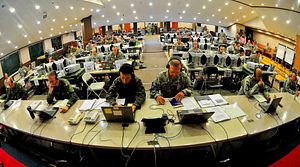South Korea and the United States announced a joint decision early on Tuesday morning to suspend this year’s iteration of the Ulchi-Freedom Guardian computerized command post military exercises. The exercise was scheduled for August and is among the major alliance exercises each year, along with the springtime Key Resolve/Foal Eagle exercises, that North Korea protests.
The decision by the alliance follows an announcement by U.S. President Donald J. Trump after his June 12 summit meeting with North Korean leader Kim Jong Un that South Korea and the United States would halt their military exercises. Trump described the exercises, which he called “war games,” as highly “provocative.”
“Following close cooperation, South Korea and the U.S. decided to suspend all planning activities for the UFG, the defensive exercise slated for August,” the South Korean Ministry of Defense announced on Monday in a message sent to reporters. “The South and the U.S. plan to continue consultations over additional measures,” the message added.
The alliance has not yet made a decision on whether the 2019 iterations of the Key Resolve/Foal Eagle exercises will be cancelled. This year, amid a new diplomatic process with North Korea that led to the third inter-Korean summit on April 27, the United States and South Korea limited the use of so-called “strategic assets” in the springtime exercises.
North Korea is particularly sensitive to the involvement of nuclear-capable assets, including B-2 and B-52 bombers, and stealth fighters. It also includes the non-nuclear capable B-1B bomber among these strategic assets; North Korea likely believes that the B-1B continues to retain a nuclear mission even though this role was eliminated for the bomber in 1994.
Since his announcement after the Singapore summit, Trump has implied that U.S.-South Korea exercises should also be cancelled because of their financial costs to the United States. “It costs us a lot of money,” Trump said in remarks to the press on Friday. “I saved lot of money. That’s a good thing for us.”
Last year, the United States and South Korea began Ulchi-Freedom Guardian exercises at a time of heightened tensions on the Korean Peninsula. The exercises began shortly after Trump threatened to bring “fire and fury” to North Korea if it continued to threaten the United States and after North Korea threatened to conduct a strike at the waters near Guam with Hwasong-12 intermediate-range ballistic missiles (IRBM).
When the exercises began, North Korea’s state-run newspaper Rodong Sinmun said in an editorial that the United States was “throwing fuel onto fire.” Toward the end of the exercises, North Korea launched a Hwasong-12 IRBM over Japanese territory, into the Northern Pacific Ocean.
Last year’s Ulchi-Freedom Guardian exercises involved more than 20,000 U.S. troops and some 50,000 South Korean personnel. The exercises were observed by the former head of U.S. Pacific Command, Adm. Harry B. Harris, and Gen. John E. Hyten, the head of U.S. Strategic Command.

































